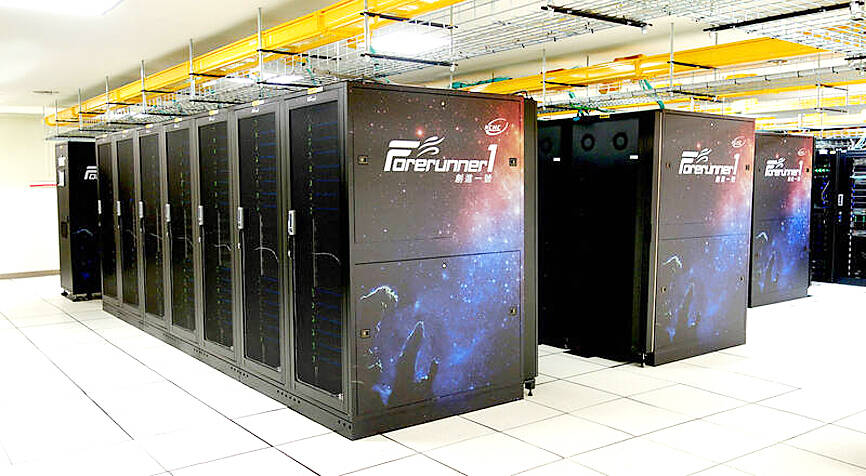The supercomputer Forerunner 1 (創進一號) has officially been launched for deployment in fields that require high-performance computing, including weather forecasts, astrophysics simulations, and engineering design and simulations, the National Center for High-Performance Computing said yesterday.
The center last year began building the next-generation supercomputer at its office in Tainan to replace the Taiwania 1 (台灣杉一號), which has been retired.
Forerunner 1 features 62,496 computing cores, with an overall performance capacity of up to 3.5 petaflops and 9.2 petabytes of storage, the center said.

Photo courtesy of the National Center for High-Performance Computing
For the first time, 40 ARM architecture computing nodes have been installed in the new supercomputer, allowing users to conduct preliminary heterogeneous architecture testing as a reference for the center when it builds new supercomputers in the future, it said.
The center has built supercomputers of different architectures to cope with large-scale scientific and artificial intelligence (AI) projects, it said.
The CPU-based Forerunner 1 is suitable for various high-performance computing tasks, including weather forecasts, astrophysics simulations, molecular model simulations, and engineering design and simulation.
Taiwania 1 was built in 2017 with a performance capacity of 1.7 petaflops, center director-general Chang Chau-lyan (張朝亮) said in a statement.
“With the rapid development of global high-performance computing and artificial intelligence, the improvement of computing power is directly related to the nation’s technological competitiveness,” Chang said.
“The center will gradually establish more powerful computing infrastructure,” he said.
The center is scheduled to complete the construction of 16 petaflops of graphics processing unit-based computing power by the end of this year to meet the needs of AI-related research and application, such as large language models, Chang said.
“We are also aiming to upgrade our computing power to 200 to 300 petaflops by 2028 to further enhance Taiwan’s competitiveness in global technology research and development,” he said.
During the pilot test, Forerunner 1 demonstrated excellent performance in many fields, including astrophysics, fluid mechanics, atmospheric science, high-energy physics and materials computing, the center said.
With the use of Forerunner 1, Academia Sinica’s astrophysics research has increased its computing speed by 5.3 times, while National Chung Hsing University and National Cheng Kung University have significantly increased the scale of fluid dynamics calculations and simulations, reducing the calculation time for billion-level ultra-fine grids from several months to 40 hours, the center said.
The next-generation supercomputer has helped elevate National Taiwan University’s air-sea coupling model test efficiency, which was 80 percent higher than that conducted by Taiwania 3, the center said.
Research on quantum chemistry and materials calculations has also been significantly accelerated, it said.

Seventy percent of middle and elementary schools now conduct English classes entirely in English, the Ministry of Education said, as it encourages schools nationwide to adopt this practice Minister of Education (MOE) Cheng Ying-yao (鄭英耀) is scheduled to present a report on the government’s bilingual education policy to the Legislative Yuan’s Education and Culture Committee today. The report would outline strategies aimed at expanding access to education, reducing regional disparities and improving talent cultivation. Implementation of bilingual education policies has varied across local governments, occasionally drawing public criticism. For example, some schools have required teachers of non-English subjects to pass English proficiency

‘FORM OF PROTEST’: The German Institute Taipei said it was ‘shocked’ to see Nazi symbolism used in connection with political aims as it condemned the incident Sung Chien-liang (宋建樑), who led efforts to recall Democratic Progressive Party (DPP) Legislator Lee Kun-cheng (李坤城), was released on bail of NT$80,000 yesterday amid an outcry over a Nazi armband he wore to questioning the night before. Sung arrived at the New Taipei City District Prosecutors’ Office for questioning in a recall petition forgery case on Tuesday night wearing a red armband bearing a swastika, carrying a copy of Adolf Hitler’s Mein Kampf and giving a Nazi salute. Sung left the building at 1:15am without the armband and apparently covering the book with a coat. This is a serious international scandal and Chinese

TRADE: The premier pledged safeguards on ‘Made in Taiwan’ labeling, anti-dumping measures and stricter export controls to strengthen its position in trade talks Products labeled “made in Taiwan” must be genuinely made in Taiwan, Premier Cho Jung-tai (卓榮泰) said yesterday, vowing to enforce strict safeguards against “origin laundering” and initiate anti-dumping investigations to prevent China dumping its products in Taiwan. Cho made the remarks in a discussion session with representatives from industries in Kaohsiung. In response to the US government’s recent announcement of “reciprocal” tariffs on its trading partners, President William Lai (賴清德) and Cho last week began a series of consultations with industry leaders nationwide to gather feedback and address concerns. Taiwanese and US officials held a videoconference on Friday evening to discuss the

PERSONAL DATA: The implicated KMT members allegedly compiled their petitions by copying names from party lists without the consent of the people concerned Judicial authorities searched six locations yesterday and questioned six people, including one elderly Chinese Nationalist Party (KMT) member and five KMT Youth League associates, about alleged signature forgery and fraud relating to their recall efforts against two Democratic Progressive Party (DPP) legislators. After launching a probe into alleged signature forgery and related fraud in the KMT’s recall effort, prosecutors received a number of complaints, including about one petition that had 1,748 signatures of voters whose family members said they had already passed away, and also voters who said they did not approve the use of their name, Taipei Deputy Chief Prosecutor